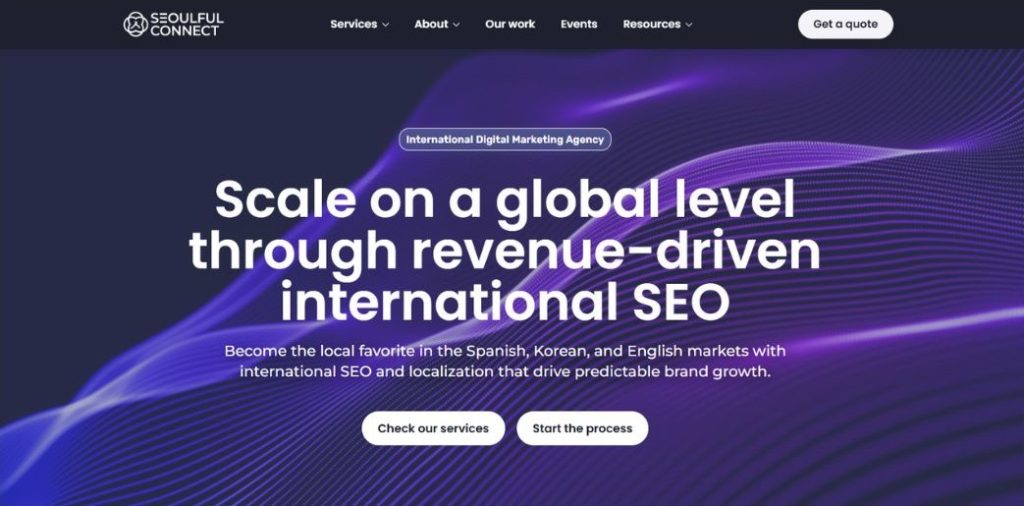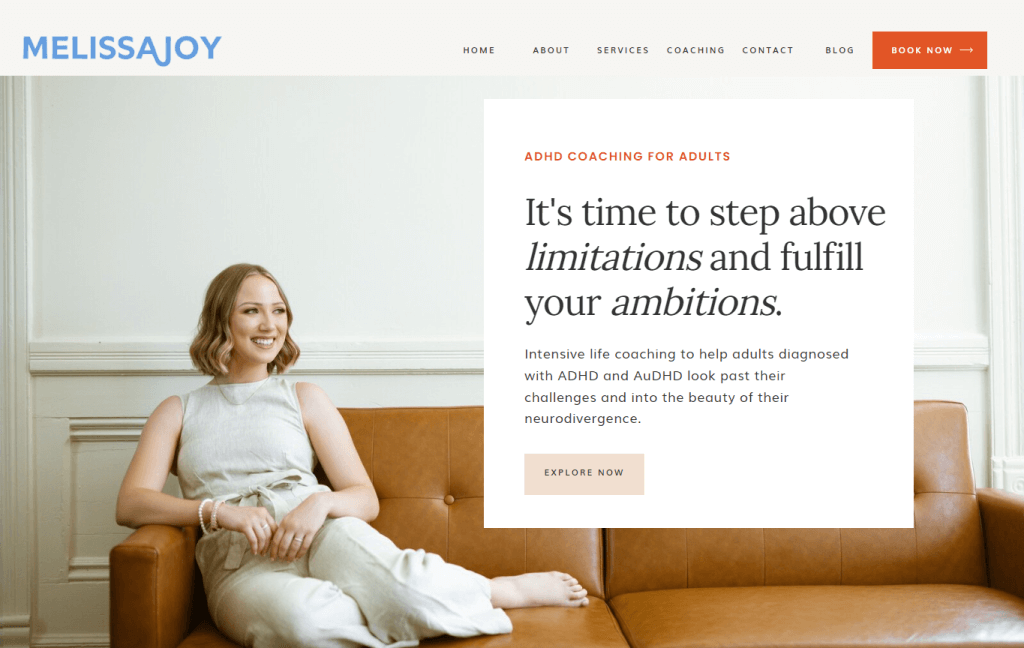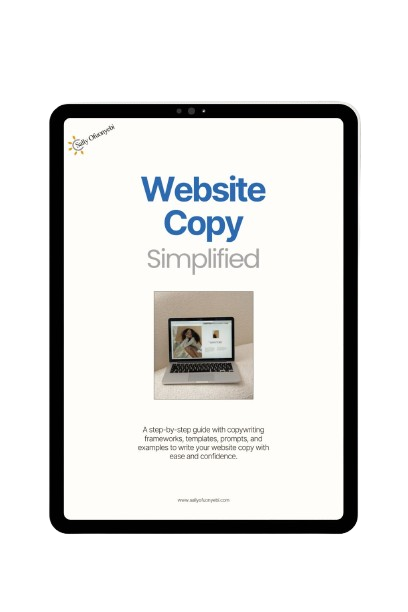What is Website Copywriting? The Ultimate Guide

What is website copywriting, and how do you do it for your business? Here’s everything you need to know.
Imagine this: You land on a website for the first time. It’s a sleek, one-page layout with a photo, a name, and a headline that says:
“Book me to be your life coach. $3,000 for 6 weeks,” and a quick listicle about what you will get for your money.
That’s it. No connection. No idea who they really are. No clue what makes them different from the hundred others doing the same thing.
Would you book them?
Probably not. And honestly, you shouldn’t.
Because in a world full of quick scrolls, tab overload, and three-second decisions, your website shouldn’t just “exist.” It has to communicate, connect, and make people take action—even if that’s the first time someone’s hearing about you.
That’s what website copywriting does.
It gives your brand a voice, your offer a story, and your audience a reason to stay, scroll, and eventually say yes.
Before we can talk about website copy specifically, we’ve got to understand the foundation of it.
What Is Website Copywriting?
Website copywriting is the specialized skill of writing persuasive and strategic sales copy for websites.
It’s more than just putting words on a homepage. It’s about creating a narrative that moves a visitor through a journey:
From “Who is this?” → “Ooooh, I love how they get me” → “Take my money already.”
Website copywriting blends:
- Brand strategy
- Human psychology
- SEO know-how
- Sales techniques
…into one seamless visitor experience.
Who Is a Website Copywriter?
A website copywriter is a professional who writes high-converting and brand-aligned sales copy for websites.
And that’s what I do.
As a website copywriter, I understand that your site isn’t just a digital brochure. It’s a first impression, a sales tool, and a trust builder all in one.
I write websites that capture your brand’s essence and translate it into words that feel personalized to the reader and profitable for the business.
Best Website Copywriting Examples
Before we get into the how-to, let’s talk about what good website copywriting looks like. Of course, these examples are copywriting projects I have worked on and am proud of.
1. Sally Ofuonyebi

Tooting my horn because I put my money where my mouth is. I say I’m a damn good website copywriter, and if you go through my website, you’ll know.
One mistake I see a lot is copywriters doing amazing work for their clients but neglecting their own websites.
I believe my site isn’t just a portfolio. It’s a working example of conversion website copywriting in action. It’s how I get cold leads to warm up and reach out.
2. Seoulful Connect

Seoulful Connect is an international digital agency by my awesome client, Raquel González. It’s the go-to, full-service solution for brands that want to dominate foreign markets. The website copy is straightforward, specific, and very on-brand.
3. Melissa Joy Adams

Melissa Joy Adams is an ADHD and executive function coach, and from the website copy, you can tell. Her copy is written in a warm, conversational, and crystal-clear tone that reflects her personality.
Each of these uses strategic structure, clear value props, and audience-first language. Looking for more website copywriting examples? Check out my portfolio.
Why a Website Copywriter Is Not a Content Writer
Let’s clear this up.
Not all writers are created equal—and that’s a good thing.
- Web copywriters write to convert. We create messaging frameworks, emotional flow, sales psychology, and UX-aware headlines that drive action.
- Content writers write to inform or engage. Think blogs, newsletters, and social media posts. They create content that is valuable but not often sales-driven.
And no, your VA or admin assistant isn’t a copywriter just because they’re great with words. Website copy is strategic sales writing, and businesses leave money on the table when they treat it like a to-do list task.
That said? You can be both a copywriter and a content writer.
The Web Copywriting Process
Let me take you behind-the-scenes into my website copywriting process and how I turn ideas into brand-aligned, high–converting messaging.
1. Research
This is the detective phase. You don’t write a single word until you know what you’re really working with.
- Brand Research: I start by uncovering the business’s values, mission, vibe, offers, and tone of voice. I do this as a part of my onboarding process for new clients.
- Keyword Research: I find search terms that their audience is using and that they can realistically rank for. I like to focus on long-tail, lower-competition keywords tied to buyer intent (e.g., “business coach for entrepreneurs”).
- Audience Research: Then, I dig into pain points, objections, desires, and buying behavior. I do ideal client research, and gather online comments and testimonials. You can grab the exact copy templates and questionnaires I use here.
2. Idea Curation
Now that I’ve gathered raw data, it’s time to make sense of it.
- What patterns are emerging?
- Which objections come up often?
- What phrases or words do customers keep using?
I collect all of this in a “copy idea bank” to use later in headlines, body copy, bullet points, FAQs, and call-to-actions.
3. Brand Messaging Development
Here’s where I define my client’s core messaging pillars:
- Who they are
- Who they serve
- What they offer
- Why it matters
- How they’re different
I also define their brand voice and personality. Are they bold and edgy? Warm and nurturing? Professional and data-driven? The brand messaging guide sets the foundation for what will make up the main website copy.
4. Copywriting
This is where I finally sit down and write with purpose, direction, and an open mind.
There are four main pages every website needs, but depending on my client’s needs, I sometimes create more.
Each website page follows a specific strategy:
- Homepage: Showcase my client’s expertise and how they help their ideal clients.
- About Page: Build connection, authority, and trust.
- Services Page: Present their offers in a way that sells the heck out of them.
- Contact Page: Remove friction and make it easy for people to reach out.
5. Search Engine Optimization
The point of writing website copy is so it can be FOUND where your ideal clients are searching for the things you do.
Now is the time to layer on the SEO strategy. Here are some things I like to do during and after writing:
- Add headings with keywords
- Optimize metadata and URLs
- Ensure internal links point to relevant pages
- Include keywords a few times in the body copy
- Use alt text for images
- And ensure the copy reads naturally while still supporting ranking goals
6. Editing
After writing, I like to take a break for a whole day before I come back to edit the drafts. My copyediting checklist include:
- Cutting the fluff
- Polishing transitions
- Fixing any typos or grammar issues
- Tightening sentences for clarity
- Ensure every line earns its place
The goal is clean, compelling copy that flows like an irresistible, real-life sales conversation.

Easy Website Copy Template
Blank screen blues? Not anymore. This plug-and-play website copy template gives you the words, the flow, and the strategy to finally nail your message all by yourself.”
Best Website Copywriting Tips for Beginners
Website copywriting is important for businesses and can transform your brand growth when done right.
Writing your website copy? Here are my best web copywriting tips for you:
1. Write to One Person
Don’t write for “everyone.”
Instead, imagine one ideal person reading your page. Write for your ideal client. Use the words you, your, and let’s.
This makes the copy feel personal and emotionally resonant.
2. End with the Transformation, Not the Task
Don’t hammer at what you do. It’s important to make it clear, but focus on what the client gets.
Instead of “I design brand strategy for creatives,” say, “You’ll walk away with a brand that finally feels like you—and connects with your dream clients at first glance.”
3. Use Real Words Your Audience Would Say
Skip the jargon and “corporate speak.” Use casual, relatable, punchy language that mirrors your reader’s voice.
- Instead of “robust solutions,” try “what actually works.”
- Instead of “leverage your expertise,” try “put your skills to work.”
4. Make It Skimmable
Not everyone has the patience to read between the lines. While great website copy keeps them enthralled, we can’t deny the obvious truth that most people scan.
So, make your message skimmable. Here are some things you can do:
- Write short paragraphs. No more than 5 lines per paragraph.
- Use italics to emphasize words
- Put key phrases in bold text
- Use bullet points
- Include subheadings to guide the eye
5. Add Social Proof Everywhere
Social proof is a key trust factor that drives conversions, and the best website copy takes this into account.
On your website, include the following:
- Client testimonials
- Logos
- Product reviews
- Stats
- Case study overviews
- Result screenshots
6. Use Strong Calls to Action
Don’t be vague. “Contact me” is okay. “Let’s plan your content strategy” is better.
Be clear, specific, and aligned with the action you want them to take.
Want more exclusive tips to improve your website conversion? Get the guide below.
How Much Does Website Copywriting Cost?
It depends on a variety of factors, such as the niche, experience, location, and results of the copywriter. It can also depend on the scope of your project.
It can range from a few thousand dollars to five figures.
Check out my custom website copywriting solution to see my rates and the deliverables you get.
Get Website Copywriting for Your Business
You can work with me to write a website that attracts your dream clients.
And if you’d rather DIY with guidance, get the website copy template that’ll help you write a website that makes people click, connect, and convert.






